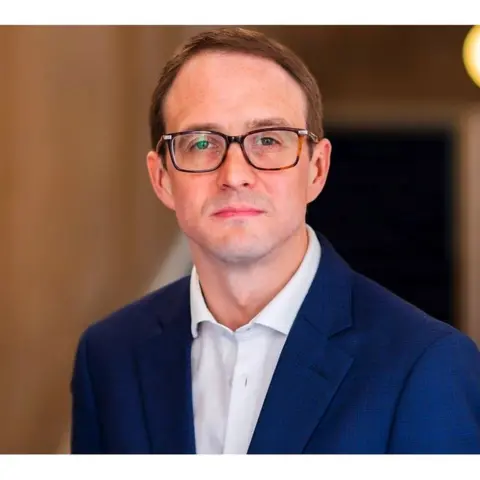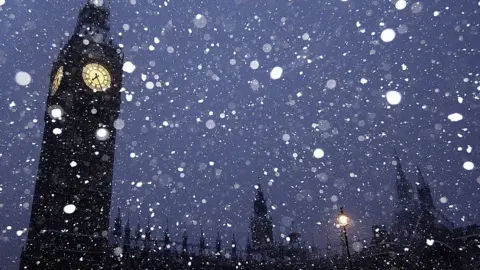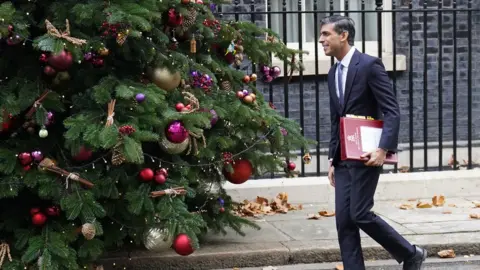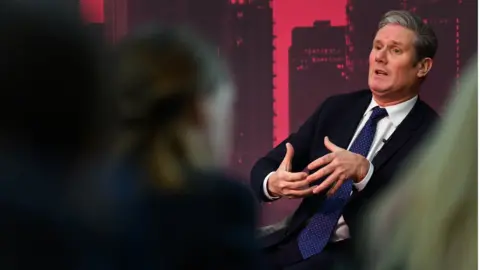Chris Mason: What to expect from politics in 2023

 Getty Images
Getty Images2022 was transformative.
The year gone by, with the political decapitation of two prime ministers, repeatedly changed how we are governed, and by whom.
But it also radically altered the dynamic between our political parties.
As we look ahead to 2023, it's the chaos of 2022 in the rear view mirror that moulds what appears to be the political road ahead.
No general election expected
For a start, political leaders across Westminster don't expect 2023 to be a general election year.
Only Rishi Sunak or a significant chunk of Conservative MPs alongside opposition parties could bring about an early election, and given Tory opinion poll ratings are in the gutter, that seems unlikely, as things stand.
The widespread expectation is the Conservatives will run the clock down on this parliamentary term.
There has to be a general election by January 2025 at the latest.
The current guessing game tends to conclude that the summer or autumn of 2024 is the most likely timing.
So that means 2023 will likely be the year before an election year - and that is likely to shape how the next 12 months feel.
"The year the election is won or lost," as one senior Labour figure put it to me. "The campaign probably won't make much difference. But 2023 will."
The Conservatives
"It was a flipping disaster," one senior minister nearly said to me just before Christmas, reflecting on the months just gone.
I don't want to crack your screen by quoting them verbatim.
The reaction to the toppling of first Boris Johnson and then Liz Truss has had several consequences.
Firstly, it's made dull exciting again.
After a year of thrash metal, an interlude of mild jazz will have a contrasting appeal to some.
Rishi Sunak embarked on his stint as prime minister by seeking to make a virtue of a quiet seriousness.
His team decided they wouldn't be noisily picking public fights, especially with their own side.
But, as we saw in the final weeks of the year, when you're in Downing Street, noisy public fights knock on that front door nearly daily and you have to choose how to respond.
 PA Media
PA MediaTo maintain that quietness can mean conceding, as Mr Sunak did on allowing onshore wind farms in England and diluting house building targets in England after pressure from his own backbenchers.
It poses a question about how much the prime minister will be able to get done on his own terms in 2023.
And how restive his backbenchers may become, particularly if the local elections in May are bleak for the Conservatives.
But one consequence of 2022 should help Mr Sunak.
I was chatting to a Cabinet minister the other day, who was reflecting that so bonkers was the instability in the Conservative Party over the last 12 months, its appetite for insurrection, for civil war, has waned.
A party which, at points, appeared to have a death wish, has had second thoughts.
As we have already seen, that doesn't mean by any means backbenchers are powerless, but talk of toppling the leaders, plotting leadership campaigns and such like feels very 2022.
The backdrop to everything is inflation pickpocketing us all and accelerating the waves of strikes we've already seen and will continue to see well into the new year.
Will ministers be able to continue to resist offering public sector workers more money?
Will the rate of price rises ease sufficiently quickly, or public opinion turn against strikers sufficiently fast for the government to be able to avoid this?
On this theme, in the early weeks of January, we can expect to see the government broaden out its plan to try to reduce the impact of industrial action, especially in the emergency services.
There are ministers pushing to see strikes banned for ambulance staff and firefighters.
Others say higher minimum service levels must be set down in law, to at least minimise the impact of such strikes.
And legislation is also promised by Rishi Sunak on small boat crossings over the Channel.
Both these issues are likely to, broadly at least, bring together the Tory backbenches, and pose interesting questions for how Labour responds.
Labour
So how will Labour approach 2023?
"I go around reminding anyone in the party who'll listen that we absolutely cannot be complacent," one senior figure tells me over a cuppa.
"We are up against the most successful electoral force there has ever been in western democracy," they add, referring to the Conservatives.
The fact the word "complacency" and the potential dangers of it for Labour is even uttered tells you everything about just how transformative 2022 was.
As Conservative fortunes in the opinion polls cratered, Labour's headed towards the moon.
Most on both sides think the current polls flatter Labour, Conservative support will pick up and things will tighten in the run in to an election.
But, nonetheless, the working assumption around Westminster is it is likely Labour will form the next government.
This assumption, even if it turns out to be wrong, is important, because it shapes the political weather of the year ahead.
Being seen as a government in waiting brings with it greater scrutiny.
 Getty Images
Getty Images"What would you do?" Will be asked of Keir Starmer and his shadow cabinet every single day of 2023.
And, often, they will sound circumspect; reticent to set out too many specific policies too early, for fear they are hostages to fortune (ie duds) or (so good) they get nicked from under their nose and implemented by the government.
Sir Keir has already spent time trying to box off potential points of vulnerability for a party seeking to persuade people who voted Conservative last time to vote Labour next time.
Hence his desire not to question the fundamentals of the UK's new relationship with the European Union and his claim the UK has an "immigration dependency" as he put it.
His challenge now, those close to him acknowledge, is to better shape people's understanding of what he stands for and make the positive case for voting Labour, rather than merely being the default alternative for those fed up of the Conservatives.
Expect 2023 to be the year the party attempts to build the profile of a handful of senior shadow cabinet figures; the faces and voices making Labour's case on the telly, radio and online.
Don't be surprised to see and hear more from the likes of shadow chancellor Rachel Reeves, the shadow education secretary Bridget Phillipson and the shadow health secretary Wes Streeting among others.
And privately, there'll be more pleas to avoid complacency.
"The polls can't predict events," warns one adviser. "Who knows what might happen?"
Scottish National Party
The story for plenty of the opposition parties at Westminster is one of confidence.
The SNP remain the overwhelmingly dominant force in Scottish politics: 15 years in government at Holyrood, and with three quarters of the nation's MPs.
But their options for securing their much dreamed about second independence referendum are running out and Labour's apparent resurgence poses interesting questions for them too.
The line "Scotland ends up with Tory governments it doesn't vote for" isn't quite so electorally potent if a Labour government looks increasingly likely after the next election.
So we are already seeing the SNP tilt some of its attack lines in Labour's direction as well as the Conservatives'.
And the party at Westminster is under new leadership: Stephen Flynn has replaced Ian Blackford; the SNP will have a new face and voice in 2023.
Liberal Democrats
Sir Ed Davey's party has just 14 MPs.
They are tiddlers in parliamentary terms, making up just over 2% of MPs at Westminster.
But there is a fair chance they have an outsized contribution to make for the remainder of this Parliament.
That is because of their by-election performances: their win in Tiverton and Honiton in Devon in 2022, after their wins in North Shropshire and Chesham and Amersham in Buckinghamshire in 2021.
In short, they have the capacity to frighten Conservatives in seats where Labour are miles behind and they are competitive.
Sir Ed is streamlining the party's campaigning effort, massively culling the number of seats the party will target at the next election.
It was miles more last time and the party went backwards, with their then-leader Jo Swinson losing her seat.
The focus is likely to be on 20 to 30 seats and trying to pick distinctive policy themes they can be seen to own.
Precisely what they are, and capturing enough attention for people to notice what they are, will be their challenge.
Reform UK
This is the political outfit that emerged out of first UKIP and then the Brexit Party.
It is led by Richard Tice, a former member of the European Parliament.
He detects political space, often, but not always, to the right of the government, since the arrival of Rishi Sunak and Chancellor Jeremy Hunt in Downing Street.
Expect policy ideas to come on education and health, with a greater involvement for the private sector in both, that will be distinctive and have the capacity to provoke a row and, so, potentially generate attention.
And, loitering in the wings, the party's president, one Nigel Farage.
The party's promising to stand in every seat in Britain at the next general election, and even though winning any will be a tall order, they have the potential to frighten some Conservatives in some spots, by luring enough voters away to allow someone else to win.
So… 2023 beckons.
And there ends my scribbles.
But as for what will actually happen… let's see!
